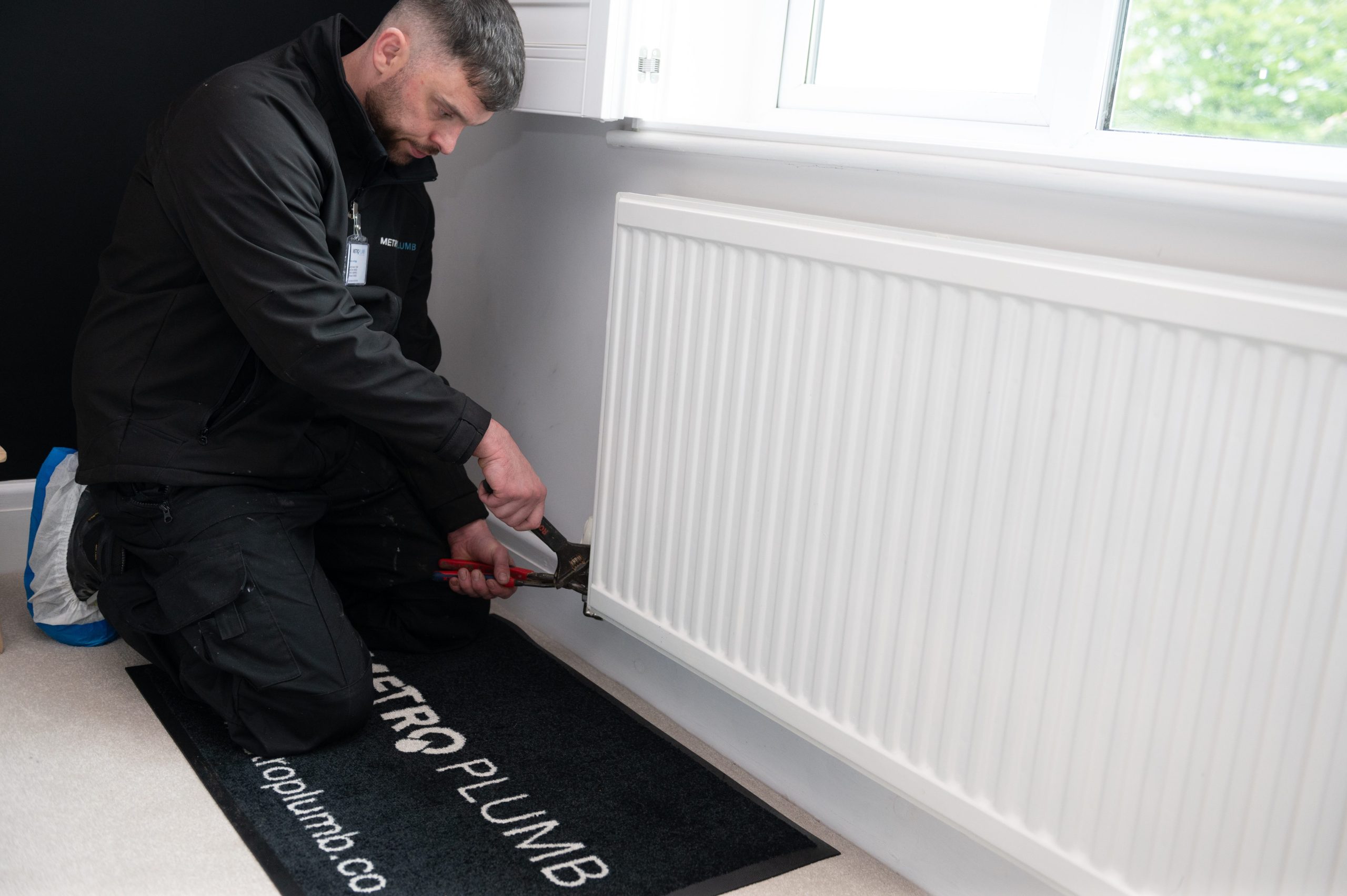Local Power Flushing
Over time, central heating systems become clogged with rust, dirt and debris, forming a sludge called magnetite. A power flush cleans all this sludge from your heating system by pushing a powerful cleanser through it. This dislodges the sludge and removes it from your radiators and boiler, ensuring they can function properly.
Regularly power flushing your central heating system helps prevent radiator blockages and rust, protects your boiler and key components like pumps and motorised valves, and ensures your system operates more efficiently.
Why suffer with a central heating problem any longer? Call our experts on 0808 250 9949 or send us a message, and we’ll get it sorted!
Our Power Flushing Service
Whether you’re dealing with a single troublesome radiator or need a complete power flush for your entire property, our skilled plumbers are ready to assist. We ensure every flush is thorough, removing sludge and debris to restore your heating system’s performance and efficiency. With the expertise to manage jobs of any size, you can count on our professional service to keep your home warm and comfortable.
Clogged radiator
Boiler issues
Central heating problems
Sludge build-up
Cold patches on radiators
Noisy radiators
How Often Should You Power Flush Your Heating System?
As a general guideline, it’s recommended to power flush your heating system every 5 years to keep it in optimal condition.
The frequency of power flushing your central heating system depends on several factors, including the material of your radiators, the age and type of your boiler, and the water hardness.
If your system includes high-quality materials, you may be able to extend it to 8–10 years while still maintaining functionality. For older boilers, more frequent power flushing may be necessary to prevent issues and maintain efficiency.
We recommend a power flush before winter, ideally at the start of Autumn, so your heating isn’t disturbed when you need it, and you can rely on it working for the colder months.
How Long Does a Power Flush Take?
The time taken to complete a power flush depends on the time of your last flush, the amount of dirt and sludge in your system and the size of your property. For a relatively clean and small system, the process may take just a few hours. However, larger systems with significant buildup could take many hours or even an entire day to complete.
Regular power flushing not only protects your heating system from issues but also makes future maintenance quicker and more straightforward for plumbers. Keeping your system well-maintained ensures a more efficient and hassle-free service when it’s time for a flush.
How Do I Know if My Radiators Need Power Flushing?
Knowing when you need a radiator power flush can prevent bigger problems down the line. Look out for these key signs:
- Cold spots, especially in the centre: Feel your radiators when the heating is on. If the centre or bottom feels colder than the top, sludge may have built up and is blocking heat. If the top of a radiator is cold, it’s more likely due to trapped air. Try bleeding the radiator, as a power flush won’t resolve this issue.
- Uneven heating in rooms: If a particular room isn’t warming up as it used to, your heating system may be struggling due to blockages.
- Brown or grey water when bleeding radiators: The colour of the water is another clue. Brown or grey water suggests a power flush is needed soon, especially if it contains small particles of dirt.
- Noises from your boiler: Rumbling or knocking sounds might indicate an issue with the boiler or the system as a whole. If this persists after servicing your boiler, sludge in the system could be the culprit.
Power Flush FAQs
Can I flush my central heating system myself?
While it’s possible to flush your system yourself, it’s not recommended unless you have the right tools and experience. Power flushing requires specialised equipment to remove sludge and debris effectively. Incorrect handling can damage your system. For best results, hiring a qualified plumber ensures a thorough and safe process.
Is it worth flushing a central heating system?
Yes, power flushing restores efficiency, improves radiator performance, and extends the lifespan of your heating system. By removing sludge and debris, a power flush can reduce energy consumption and prevent costly breakdowns, making it a worthwhile investment in the long run.
Can a plumber do a power flush?
Plumbers are trained to perform power flushes safely and effectively. They use industry-grade equipment to clean your system, ensure better heating performance and reduce the risk of future issues. Professional expertise makes the process faster and more reliable.
How much does it cost to power flush a heating system?
Power flush heating system costs vary depending on the size of your heating system, its condition and location. Larger or heavily clogged systems may cost more.
Do you need access to all radiators for a power flush?
Yes, full access to all radiators is essential for an effective power flush. Each radiator needs to be cleaned individually to remove all sludge and debris. Ensure that radiators and pipework are easily reachable before the plumber arrives.
Is power flushing a good idea?
Yes, power flushing is highly beneficial for maintaining central heating efficiency. It prevents blockages, improves heat distribution, and protects your boiler and radiators from damage. When done regularly, it helps avoid expensive repairs and extends the lifespan of your heating system.
What are the pros and cons of a power flush?
Pros:
- Removes sludge and debris, improving efficiency.
- Restores even heating across radiators.
- Extends the life of your boiler and system.
Cons:
- Can be costly upfront.
- Might not resolve severe issues in old systems.
Despite the cost, the long-term benefits often outweigh the drawbacks.
Need Some Help and Advice?
Our teams are experts in all things plumbing – so here they share some of their tips, guidance and advice with you.












